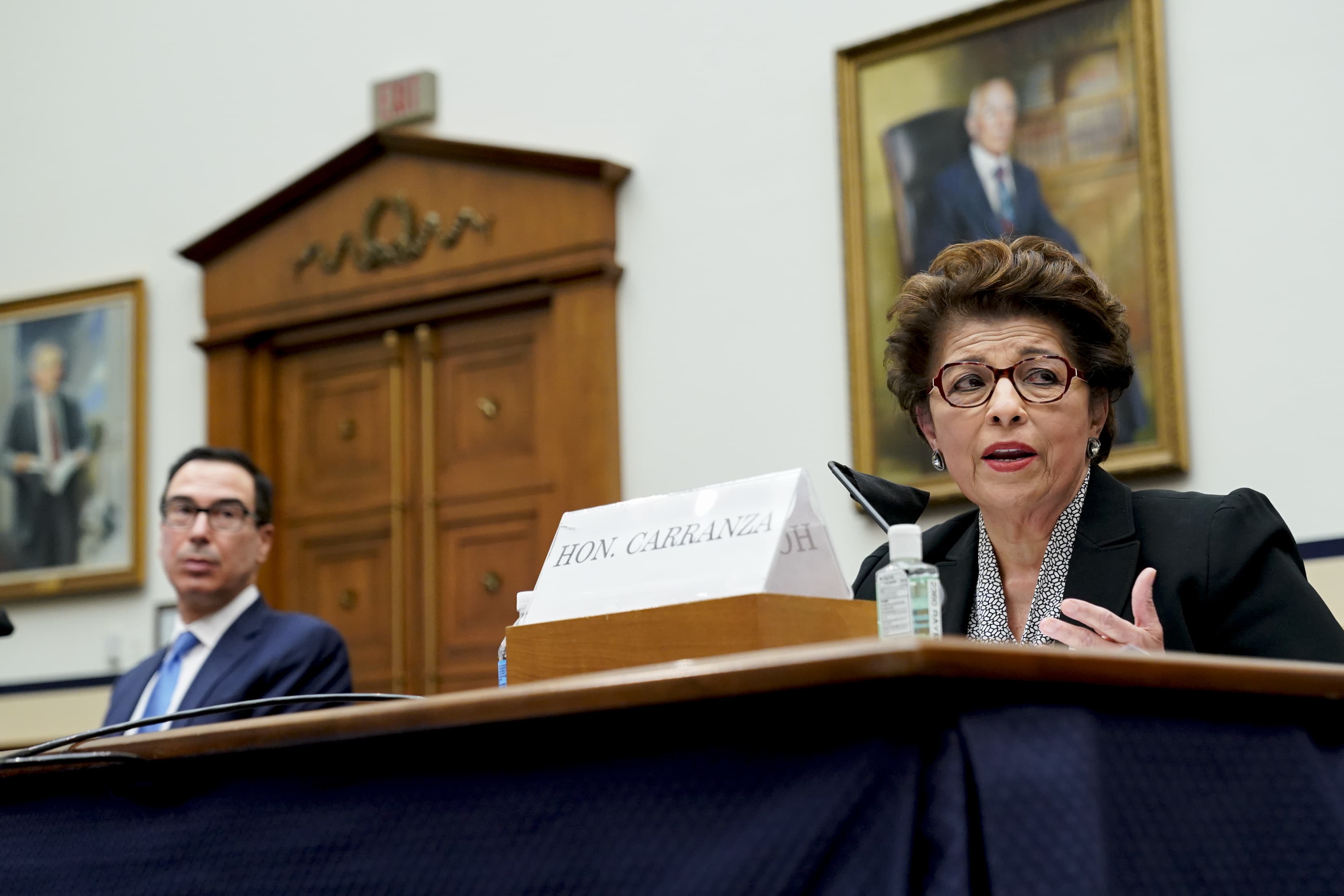Here's what small business owners, many cash-strapped, want from the next GOP coronavirus bill

Jovita Carranza, administrator of the U.S. Small Business Administration (SBA), speaks as Steven Mnuchin, U.S. Treasury secretary, left, listens during a House Small Business Committee hearing in Washington, D.C.
Erin Scott | Getty Images
Details of Senate Republicans' version of a coronavirus aid bill are starting to emerge. Accountants question whether it will provide enough relief to small businesses.
GOP lawmakers expect to release their aid bill next week. The proposal is expected to call for another round of stimulus checks and an extension of the enhanced federal unemployment payments – albeit "based on approximately 70% wage replacement," according to Treasury Secretary Steven Mnuchin.
Small businesses – many of which are feeling the squeeze as coronavirus continues to rage – also get additional relief.
The Senate GOP bill is expected to authorize a second round of Paycheck Protection Program loans, intended for firms that are suffering from the effects of Covid-19.
"We want to have second checks for companies whose revenues are down 50% or more and need more money," Mnuchin said on CNBC Thursday morning.
Democrats, of course, have their own idea of what the next relief bill should include. Consider the Heroes Act, which passed the House in May.
Tax professionals say that while a second bite of the PPP apple would be greatly appreciated, small businesses will need more than that to stay afloat.
In particular, they want tax deductibility of any business expenses paid for with PPP proceeds.
"Essentially without deductibility, the business owner's taxable income will be higher this year, and it will create a larger tax liability at a time when every dollar counts," said Jeffrey Levine, CPA and director of advanced planning at Buckingham Wealth Partners in Long Island, N.Y.
Forgivable loans, higher taxes
halbergman
A key feature of PPP loans is that borrowers may be eligible for forgiveness, provided they spend at least 60% of their proceeds on payroll costs. They may be eligible for partial forgiveness if they fall short of that threshold.
The forgiveness itself is exempt from taxes.
However, the IRS has blocked borrowers' ability to write off salary costs and other expenses covered by PPP funds. This is to prevent them from taking a so-called "double tax benefit."
Lawmakers on both sides of the aisle disagree with this. Sens. Chuck Grassley, R-Iowa, and Ron Wyden, D-Ore., in fact pitched a bill that would allow for the deduction of those expenses.
Barry Melancon, CPA and CEO of the American Institute of CPAs, also asked for deductibility in a July 20 letter to Sen. Mitch McConnell, R-Ky., and Rep. Nancy Pelosi, D-Ca.
"PPP recipients, particularly the smallest businesses, cannot afford to be surprised with a tax bill on their PPP loan expenses next year," Melancon wrote.
Tax deductions save taxpayers money by allowing them to cut down their taxable income. Without these write-offs, entrepreneurs' income seems higher on paper than it actually is.
"Without deductibility, there's more taxable income generated by the business and it results in higher taxes," said Levine.
Simplified forgiveness
Another item accountants hope to see in the new bill is streamlined PPP loan forgiveness.
Sen. Kevin Cramer, R-N.D., introduced the Paycheck Protection Small Business Forgiveness Act at the end of June. This measure calls for automatic forgiveness of PPP loans that are no more than $150,000.
Having the balance wiped is easier said than done. For starters, the Small Business Administration has a forgiveness application available, but it won't begin processing data from the banks until Aug. 10.
That date could be pushed out even further as Congress works through further relief legislation.
"Firms advising these businesses want to provide them with clarity on the forgiveness process," said Erik Asgeirsson, CEO of CPA.com, the technology arm of the AICPA.
More from Personal Finance:
How deciding who would be eligible for next $1,200 stimulus checks could change
The $600 unemployment boost is likely ending. How you can access cash now
These are the taxpayers who benefit most from Trump's call for a payroll tax holiday
Though the Treasury and SBA have rolled out guidance on PPP loans this spring in a periodic release of "frequently asked questions," the agencies haven't updated their FAQs in about a month.
Practitioners still have plenty of lingering questions and few ways to proceed.
"We are still waiting for 30 frequently-asked questions – which will be out after the new relief bill," said Adam Markowitz, enrolled agent at Howard L Markowitz, CPA PA, in Leesburg, Florida.
"They want to start forgiveness on Aug. 10th, but they don't want to give us the questions."
Without further clarity from lawmakers on forgiveness and deductibility related to PPP, tax planning for small business owners remains at a standstill.
"I don't know where this leaves us as tax practitioners," Markowitz said. "We're in the spot of not knowing what to tell clients."
Read More
Source

No comments